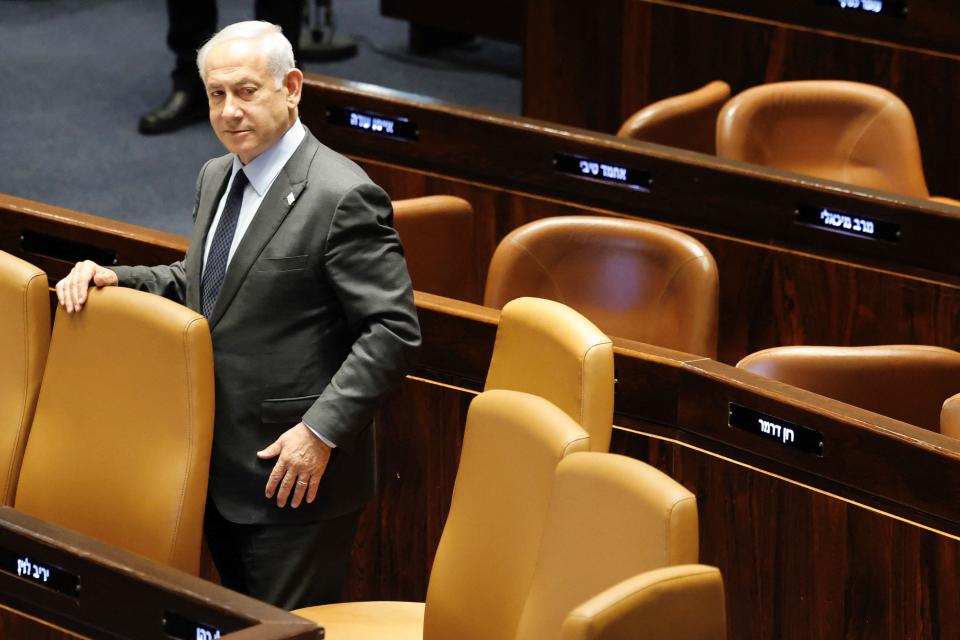Israel 2023: The triumph of Israel's Declaration of Independence | Opinion
- Oops!Something went wrong.Please try again later.
A very unique combination of circumstances led to the establishment of the current Israeli government. Since taking office at the end of December 2022, the governing coalition has tried to reform the judicial system through a blitz of legislation. The predatory-style tactics and the content of the legislation have generated a profound and very justified concern among many Israelis that this reform is, in fact, a coup aimed at turning Israel into an ultra-national, conservative dictatorship.
The current government is based on a coalition of three partners: the Likud party, the largest of Israel's parties; the religious Zionist camp; and the ultra-Orthodox (Haredi) camp. Each of the partners has an interest in such a coup. The prime minister of Israel and the leader of the Likud party, Benjamin Netanyahu — a skilled and charismatic politician — wants to gain control over the judicial system to evade indictment over corruption charges he is facing. The extreme wing in the religious Zionist camp together with politicians from the ultranationalist-conservative wing of Likud sense an opportunity to form a conservative ultranationalist dictatorship. Members of the ultra-Orthodox camp sense an opportunity to enshrine laws that reflect their worldview and to fortify and strengthen their achievements on issues important to them and their base, such as a complete exemption from military service and increased budgets to finance a vast array of religious, economic and social institutions in the ultra-Orthodox society. Their resolute, unwavering and aggressive determination in pursuing this legislation resulted in massive public protests representing the sentiments of most Israeli Jews. And there were increasing warnings from leading experts in varied disciplines about the profoundly harmful consequences of the legislation for the state of Israel from every conceivable angle. However, the architects of the blitz turned a blind eye and a deaf ear and continued unabated, full steam ahead.

On March 27, after three months of mass protests, Netanyahu announced the freezing of legislation until July 2023. On prime-time television, he announced his intention to enter a phase of talks, mediated by the president of Israel, between the representatives of the coalition and the opposition to forge agreements on the content of the reform that would be acceptable to the parties.
One reason for Netanyahu's decision was the resistance and actions of powerful forces such as academia, the Histadrut — the umbrella organization of the labor unions — the finance, high-tech, business, and industrial sectors, the security establishment, judicial circles and others. Another reason was the growing criticism by Western governments, particularly the Biden administration and its demand that Netanyahu calm the situation.
But there is a more central, more fundamental reason for the failure of the attempt to bring about a coup in Israel. The architects of the blitz failed to recognize a powerful player: the Declaration of Independence of the state of Israel.
Israel does not have a constitution in the formal sense of the term. It has a set of laws, some of which are defined as basic core laws. But it does have a document called the Declaration of Independence, signed in 1948 by the founding fathers of the state of Israel — religious and secular, left and right, conservatives and liberals.
The word "democracy" is not mentioned even once in the Declaration of Independence of the state of Israel. However, the words contained within resolutely and unwaveringly reflect the values, ideas, ideals and spirit of democracy, freedom, progress and moderate and enlightened Judaism.

Those who tried to bring about a coup did not understand that Israel's Declaration of Independence is part and parcel of the mind, heart, body and soul of the absolute majority of Israeli Jews — it flows in their veins and is imprinted in their souls. The Declaration of Independence of the state of Israel is an inseparable part of the DNA of the state of Israel and the Jewish people.
It is this DNA that fueled 12 weeks, and counting, of spontaneous, grassroots mass protests by hundreds of thousands of Israeli citizens — most of them Jews — religious, secular, from the left and from the right, newcomers and veterans, from different economic backgrounds and all walks of life, from all areas of the country, including those from Judea and Samaria, who have stood up as one to thwart the attempted coup. It is this DNA that fuels the mass participation in the protests of an enormous number of young Israelis — many of whom were born decades after the Declaration of Independence.
In the short and medium terms, we will witness several developments.
First, on the political level: The failed attempt to launch a coup in Israel will lead to severe upheaval in the Likud party. The Likud is essentially an inseparable part of the pragmatic and liberal mainstream Zionist center camp. Over the past few decades, against the background of a challenging and complex reality fraught with many challenges, in an era of vulgar and polarizing discourse, and in light of the formation of a cult leader in Likud — namely Netanyahu — the wing of Likud that wanted to advance an agenda of conservative ultranationalism combined with populism and demagoguery grew stronger. The failed coup and the expected end of the Netanyahu era (whether he remains prime minister until the end of his term or not) fuel a growing power struggle within Likud, which may strengthen the pragmatic-liberal wing at the expense of the ultranationalist-conservative wing. Such a development — if it does happen — is good news for the state of Israel, because it will further strengthen the pragmatic, mainstream Zionist camp, which is the main backbone of the state of Israel and represents the absolute majority of Israeli Jews.
Second, we will witness the evolution of a political and public discourse, the goal of which will be to try to create boundaries and establish ground rules for the political system that will be acceptable to the main players of Israeli politics. This will be a tense process steeped in extreme suspicion between the parties. Most Israelis support this attempt, because it can contribute to calming the situation and creating a space for productive discourse, which is a necessary condition for the fusion of the rift.
The trauma Israel is experiencing in 2023 will leave its mark. And as in any traumatic situation, there is a difference between pre- and post-trauma. The most critical and dramatic implication of this challenging and difficult chapter is the fact that, in 2023, a crystal-clear and unwaveringly firm truth echoed in the streets and cities of Israel. "Yes" to reform that is done through a process of dialogue and agreement. "No" to a coup.
The state of Israel is not — and will not be — a banana republic. The state of Israel is not — and will not be — a dictatorship. The state of Israel is the home of the Jewish people, an advanced state with economic, military, scientific and technological power, a pluralist democracy in which there is a system of checks and balances between the authorities, equality before the law, protection of minorities and the disenfranchised, with a continued emphasis on human and civil rights, and conceptual and moral pluralism.
The state of Israel is a young country of an ancient nation — the Jews. The DNA of this nation and this country consists of a sense of a mission for mankind, a belief in a shared destiny, mutual responsibility and guarantees of the knowledge that we have no other home, and the Declaration of Independence, which is the unofficial constitution of the state of Israel. This DNA is Israel's eternal and everlasting compass and a source of its power, incredible achievements and survival.
Avi Melamed was first deputy and then senior Arab affairs adviser to Jerusalem Mayors Teddy Kollek and Ehud Olmert, serving as a negotiator during the first and second intifadas. The author of "Inside The Middle East | Entering a New Era" and a former Israeli intelligence official, Melamed is the founder and chief education officer of Inside the Middle East, a nonprofit devoted to providing professional knowledge about the Middle East and empowering critical thinking by way of nonpartisan and innovative education.
This article originally appeared on NorthJersey.com: Israel judiciary unrest Netanyahu what comes next

